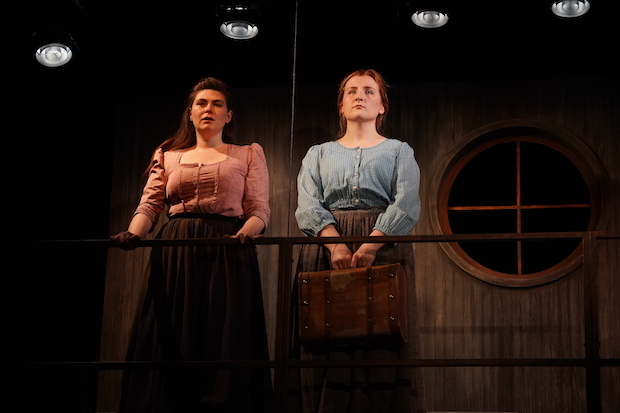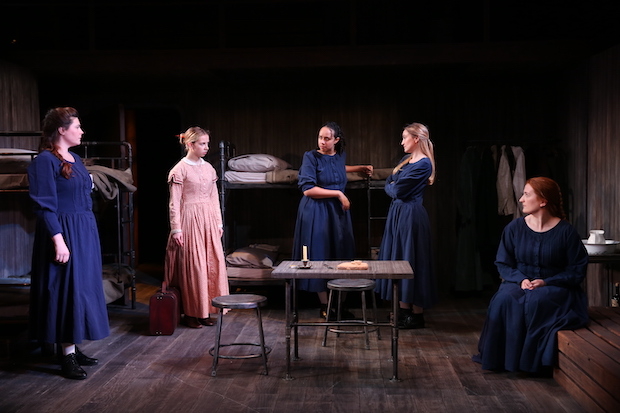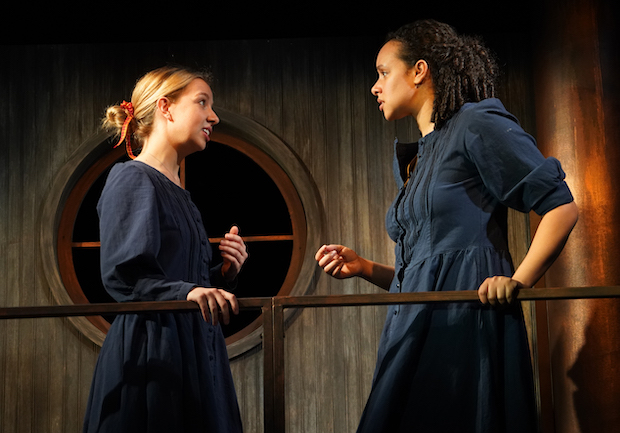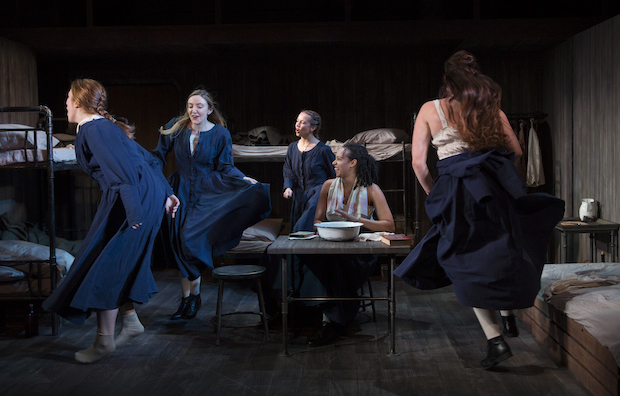Review: Belfast Girls Unveils Secrets and Lies on the Long Journey to Australia
Jaki McCarrick’s immigration drama makes its off-Broadway debut.

(© Carol Rosegg)
You really get to know a person by sharing a ship's cabin with them. The discovery of repulsive personal habits, epic fights, and significant homosexual experiences — anything can happen on the high seas! Modern Americans and Australians mostly get this opportunity on pleasure cruises, which rarely last more than a week or two. So one can only imagine what might have gone down in steerage on the 19th-century passage from Ireland to Australia, a journey that took nearly three months to complete. That's the setting for Jaki McCarrick's Belfast Girls, now making its New York debut at Irish Repertory Theatre.
McCarrick is not the only playwright to recognize the dramatic potential of a group of women on a boat enroute to Australia: Laura and Linda Good's LadyShip is about women prisoners sentenced to serve down under circa 1789, while Larry Kirwan and Thomas Keneally's Transport (which made its 2014 world premiere at Irish Rep) tells a similar story from 1838.
Belfast Girls (which predates the aforementioned musicals and was shortlisted for the Blackburn Prize in 2012) takes place in 1850 following the worst of the potato famine. Unlike their convict forebears, this group of Irish women have chosen to leave for Australia rather than languish in the miserable poverty of Belfast. In a sun-drenched land full of rich farmers looking for good Irish wives, "we're to be mistresses of our own destiny," promises Judith (Caroline Strange), an evangelist for this promised land and the clear leader of the group. She is joined by her friends "fat" Hannah (Mary Mallen), "stupid" Ellen (Labhaoise Magee), and Sarah (Sarah Street), who is given no insulting adjective — which immediately leads us to suspect she's trouble.

(© Carol Rosegg)
This jolly foursome use luggage to cordon off a prime corner of steerage, but the addition to this makeshift cabin of the mysterious Molly (Aida Leventaki) and her suitcase full of radical books threatens to disrupt their fragile ecosystem.
No one is being perfectly honest about their presence on this ship. Touted by colonial secretary Earl Henry Grey as a mission to send poor orphans of good character to Britain's distant colony, the boat is teeming with former prostitutes and mill workers. Far from virginal teenagers, these girls put the fast in Belfast. But isn't one of the benefits of emigration the opportunity to start over as a new person in a new land?
Clocking in at two hours, 30 minutes, Belfast Girls makes us feel the sheer length and tedium of the Australian passage. McCarrick's script sprawls with awkwardly introduced backstories and intimate two-person scenes exploring the relationships among the women, not all of which are equally fascinating. Her attempts to capture the gritty parlance of Belfast streetwalkers makes for fun listening, but occasionally veers into camp: "You'll have no land down under, ya understand? Because I'll rape ya," Judith tells one of her shipmates as she holds a knife near her nether regions, "I'll rape ya with this…I'll shuck ya like I did a thousand oysters." It makes some of the prison exploitation films of the last century seem modest.

(© Carol Rosegg)
One relationship that does hold our attention is between Judith and Molly. Strange and Leventaki simmer in an attraction, both intellectual and physical, that takes the entire first act to build. They gaze into each other's eyes as they talk of Marx and the revolutions of 1848, and both actors make this synthesis of the personal and political seem perfectly natural. Leventaki gives an especially heartbreaking performance in the second act, when a significant plot point causes her to change irrevocably.
Director Nicola Murphy leads the rest of the cast to solid performances on a set that conveys the claustrophobia of a 19th century sailing vessel (set design by Chika Shimizu). Drab costumes by China Lee and dim lighting by Michael O'Connor offer a palpable sense of life below deck, while Caroline Eng's sound design (featuring gulls, crashing waves, and the distant sound of a raucous party in another part of the boat) injects an element of excitement.

(© Carol Rosegg)
While Murphy excels at unpacking the relationships among the women, some of her staging choices feel incomplete: During a particularly nasty storm, the actors hurl themselves across the stage, yet we cannot help but notice the ceramic water jug resting serenely on a nearby table. The actors need not smash it like waiters in a Greek restaurant, but it could have at least been removed from the stage. Similarly, we are shown early on that people can enter and exit the room by crashing through the wall of luggage, yet they curiously seem to forget this when the main cabin door is locked later in the play. It is difficult to focus on the story when we are regularly questioning the rules of the space.
These flaws aside, Belfast Girls offers a welcome fresh perspective on the myths that still dominate popular narratives about the immigrants of a previous era. It wasn't all rugged adventurers, nor were British emigration schemes merely a way to make the very poor disappear. The truth lies somewhere in between, in the wide ocean between here and there.









